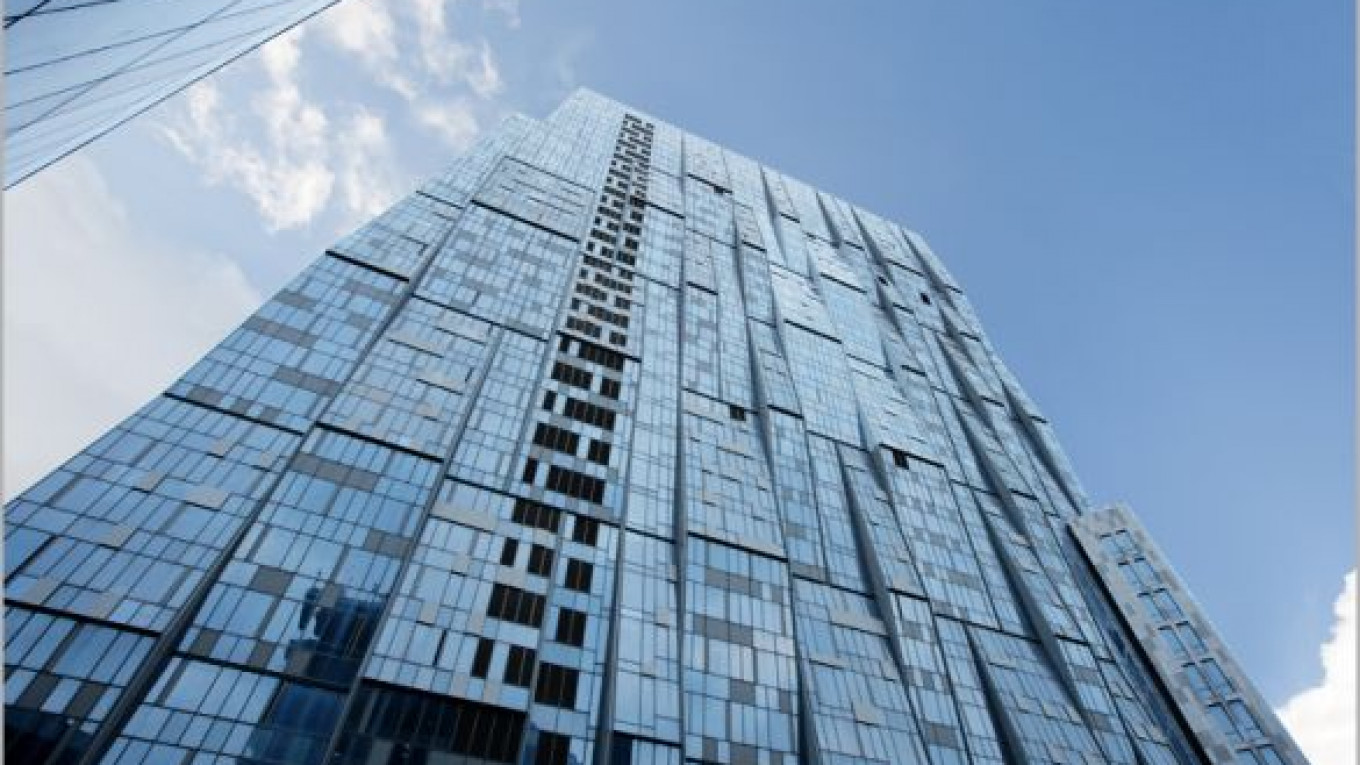City Hall may force developer Don-Stroi to lop several completed stories off a giant luxury apartment complex in southwestern Moscow, saying the extra floors were built without prior approval.
A source in the Mayor's Office told RIA-Novosti on Wednesday that as many as 22 stories could be ordered demolished, although City Hall spokesman Sergei Tsoi told Russian news agencies later in the day that eight or nine floors could be enough.
"Everything that was built without documents needs to be brought into accordance," Oleg Mitvol, prefect of Moscow's Northern Administrative District, told The Moscow Times.
Mitvol, who campaigned against illegal housing in his previous job as a federal environmental inspector, said Mayor Yury Luzhkov called the illegal construction "impudence" and that it was "time to stop it."
Moscow officials have recently stepped up their attempts to punish illegal construction, including the controversial demolition of homes in the Rechnik neighborhood this winter.
But knocking floors off a high-rise seems to contradict Luzhkov's stated goal of eliminating the city's old, five-story apartment buildings by 2012 to make way for high-rise housing to accommodate the city's burgeoning population.
Luzhkov's commission to combat illegal construction met late Tuesday and decided that the extra floors might need to be removed, since they were not part of the initial agreement with city authorities.
The skyscraper, known as Dom na Mosfilmovskoi, consists of two towers — one 47 stories high, the other 32 — and a seven-story bridge section, according to Don-Stroi's web site.
The development is undergoing interior work, which is slated to be finished this year. The 213-meter building's 564 apartments will range in size from 59.3 square meters to 389 square meters, the site said.
Don-Stroi might have to return money to clients who have already bought apartments in the building, Mitvol said, recalling a similar situation in his district when a developer built 30 percent of an office center without prior approval.
Mitvol said he did not know how many floors needed to be razed.
Developers were given a freer hand after legislation intended to ease oversight of small businesses passed last year allowing construction companies to be inspected only once every three years, he said.
A spokesman for City Hall could not be reached on his mobile phone. ?
Don-Stroi denied that it had received any orders from the city to demolish part of the project.
"There are no decisions … or ordinances regarding demolishing stories in the Dom na Mosfilmovskoi apartment complex," the company said in an e-mailed statement.
The company will fulfill its obligations to buyers in the complex "in full," the statement said. A Don-Stroi spokeswoman declined additional comment.
“There are two types of illegal construction in Russia: when a developer has no title to the construction plot and when it has no construction permit," said Vladislav Sourkov, a partner with international law firm CMS.
"The legislation says a simple thing in these circumstances: demolition," Sourkov said, adding that only the part constructed without permission was usually to be razed.
As a result, developers have become more responsible when getting permits.
"The market is gradually changing for the better. In recent years, developers have become more responsible, largely under the government's influence," he said. "Five to seven years ago, it was the norm to build without a permit or to receive the permit during the course of construction."
City Hall was widely criticized earlier this year for what residents called an arbitrary application of the law as it razed homes in the Rechnik settlement. Some of the buildings were built in an environmentally protected zone, although parts of it had been a residential community for decades.
The demolition was stopped after President Dmitry Medvedev intervened in the conflict. City Hall then set its sights on the nearby Fantasy Island community — which Vedomosti reported was home to two ministers and a billionaire — because residents failed to provide valid ownership documents.
Luzhkov said the settlement would share Rechnik's fate, although the spat appears to have died down.
Don-Stroi, which is focusing on residential and commercial construction, was among the developers most hit by the financial crisis, and its debt stood at $3 billion at the beginning of this year. ?
Last year, its biggest creditor, state-run VTB, received 50 percent plus one share in Don-Stroi-Invest, which owns the developer's residential projects, as part of the restructuring of the parent company's $500 million debt.
The bank will get the rest of Don-Stroi-Invest from the developer's founders — Maxim Blazhko and Dmitry Zelenov — as early as July, a source close to Don-Stroi's shareholders told Kommersant on Wednesday.
A Message from The Moscow Times:
Dear readers,
We are facing unprecedented challenges. Russia's Prosecutor General's Office has designated The Moscow Times as an "undesirable" organization, criminalizing our work and putting our staff at risk of prosecution. This follows our earlier unjust labeling as a "foreign agent."
These actions are direct attempts to silence independent journalism in Russia. The authorities claim our work "discredits the decisions of the Russian leadership." We see things differently: we strive to provide accurate, unbiased reporting on Russia.
We, the journalists of The Moscow Times, refuse to be silenced. But to continue our work, we need your help.
Your support, no matter how small, makes a world of difference. If you can, please support us monthly starting from just $2. It's quick to set up, and every contribution makes a significant impact.
By supporting The Moscow Times, you're defending open, independent journalism in the face of repression. Thank you for standing with us.
Remind me later.


